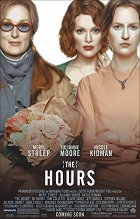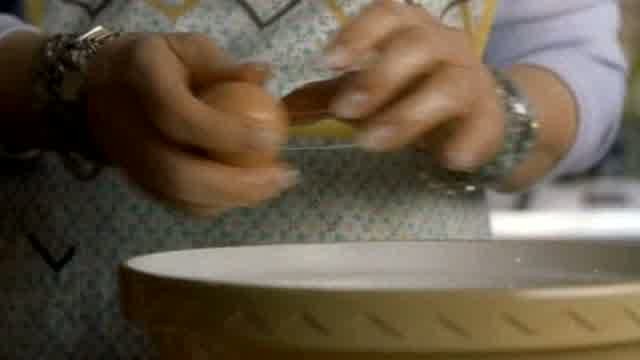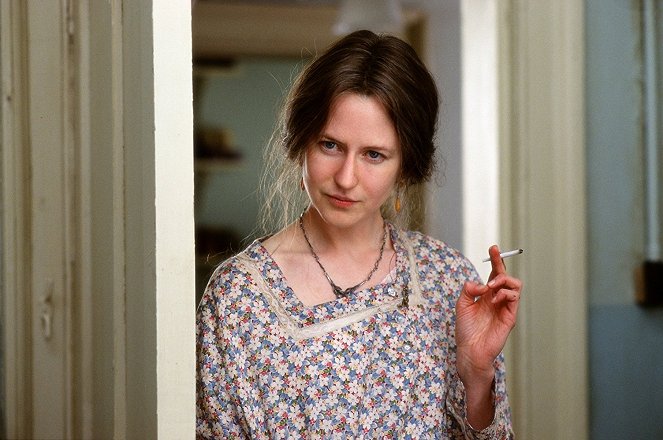Directed by:
Stephen DaldryCinematography:
Seamus McGarveyComposer:
Philip GlassCast:
Nicole Kidman, Julianne Moore, Meryl Streep, Stephen Dillane, Miranda Richardson, Sophie Wyburd, Lyndsey Marshal, Linda Bassett, Christian Coulson (more)Plots(1)
Three women from different eras who are linked by their common yearnings and fears. Virginia Woolf (Kidman),in a suburb of London in the early 1920s, is battling insanity as she begins to write her first great novel, Mrs. Dalloway. A wife and mother in post-World War II Los Angeles, Laura Brown (Moore) is reading Mrs. Dalloway and finding it so revelatory that she begins to consider making a devastating change in her life. Clarissa Vaughan (Streep), a present-day version of Woolf's Mrs. Dalloway, lives in New York City and is in love with a friend (Ed Harris) who is dying of AIDS. (StudioCanal UK)
(more)Videos (1)
Reviews (8)
Stephen Daldry and his college drama, where an ambitious storytelling style is aptly matched by impressive performances (though the focus is on the central female trio, Ed Harris leaves a damn strong stamp on it). The problem comes at the level of some deeper identification with the characters, as the whole thing felt like it had to come automatically. With Philip Glass's fantastic score, the aforementioned performances by the cast, and the crafted, essentially flawless direction, you just can't help but feel the slightest emotional emptiness at the end. I may not be the target audience (and I'm a pretty big target even at 31) and I can't connect to the fates of the female characters as deeply as Stephen Daldry, but I still have to say that everything else here is great. I find it fascinating that such a powerful female story could be so intimately and sensitively directed by a man, hats off to him. [80%]
()
The way three stories are connected here is truly unique, as is the unique connection not only in content, but also in the actual linking of individual plotlines. Formally and in terms of acting, I really liked the film. However, I can't help but feel that in the end, the movie didn't tell me that much.
()
An unquestionably effective film with great direction and superb performances (Julianne Moore!), but I was unable to relate to the characters. The women’s worldviews are portrayed so perfectly that I could not understand them. In short, my ideas simply don’t agree with this film. It took about two years and then she told him: Hey, I’m lesbian. Wow.
()
An existential examination of the female mind in a state of uncertainty, doubt and dissatisfaction. A haunting subject filmed by a man better than a woman ever could. I couldn’t identify with the suffering characters in every moment, but I could see myself in ninety percent of the runtime. Stephen Daldry pulled off a miracle. With another viewing, I will probably raise my rating to five stars. It’s impossible to take it all in the first time.
()
The Hours is a classic film about which you can’t form a clear opinion during a single watch. Not only because the film is divided in a postmodern way into three time-spaces, connected both motivically and through characters. From this perspective, this is one of those simpler jigsaw puzzles, the principle of which you can unveil very easily, because Stephen Daldry's goal is not to confuse the viewer... In the first space-time, Virginia Woolf experiences a difficult struggle with illness and misunderstanding (phenomenal performance by Nicole Kidman!). Her novel Mrs Dalloway grows out of feelings of misunderstanding, loneliness and uprooting. This book was read in the 1950s by Laura Brown (the fragile and closed-off Julianne Moore), a mother living in the illusion of a happy family but struggling inside with similar feelings of misunderstanding as Virginia. In 2001, Clarissa Vaughan (suggestively played by Meryl Streep) gets the name of the heroine of the novel half jokingly... it's probably not worth emphasizing that she too struggles with life disillusionment, misfortune and the fateful man she loves, who threw her away long ago... All of the protagonists are connected by Woolf's novel, a similar emotional state and lesbian tendencies. All of this is intertwined in a difficult complex of relationships and emotions, and they go through a painful catharsis during a single "film" day. On one fateful day, the three levels of the story intertwine into a relatively coherent film ensemble, which at first lacks gradation and drowns in big words (the intellectual patheticity still holds on to it at a tolerable level), but at crucial moments it always has a great emotional charge and the gift to grab on to the viewer and make us think. A bit of an obstacle for me is the gender filter in seeing men as a) submissive and effeminate intellectuals (Leonard Woolf), b) wrecked and aimlessly wandering artists (Richard Brown), c) dull and inattentive domestic animals (Richie Brown). Despite the partial antipathies, however, I admit that The Hours has great inner strength and considerable stylistic maturity. Thanks to which, and also thanks to the sensitive directing and excellent music of Philip Glass, they amount to a great spectator experience...
()



Ads